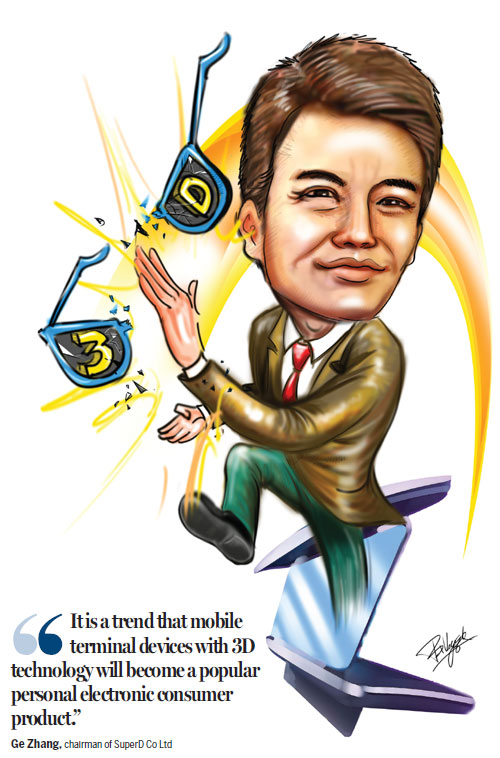3D revolution in the making
Updated: 2015-12-10 07:42
By Chai Hua in Shenzhen(HK Edition)
|
|||||||

Editor's note: A Shenzhen entrepreneur is propagating glass-free 3D display devices as the ideal video entertainment device of the future. His conviction is that such technology is right on track to revolutionize the entire mobile-phone industry chain.
Glass-free 3D technology is possible in producing the next game-changer product consumers have been waiting for, while the mainland's smartphone market remains stagnant quarter-on-quarter and competition among major brands has never been stiffer.
Ge Zhang, chairman of SuperD Co Ltd - a Shenzhen-based 3D glass-free solutions provider - reckons that 3D technology will soon revolutionize the entire mobile-phone industry chain.
"With more high-quality 3D content, such as in movies and games, as well as the maturity of application technology and improvement in image processing, it's a trend that mobile terminal devices with 3D technology will become a popular personal electronic consumer product," he says.
In retrospect, television manufacturers had adopted the 3D display technique some five years ago when Avatar hit the screen, with mainland audiences deeply impressed by the use of 3D technology in home entertainment for the first time. But, it soon faded from the main stream market due to poor viewing experiences as well as a lack of content sources.
SuperD, established in 2004, has been exploring advanced technologies with more than 550 patent applications, including the facial tracking technology that uses the embedded camera on the device and re-renders the image to enhance viewing quality.

Lu Renbo, deputy secretary-general of the China Electronics Chamber of Commerce, believes consumer demand for mobile terminal devices and family entertainment will grow in line with the continuous development of mobile Internet and smart-home technology.
"Especially for young generations, glass-free 3D technology will dictate our future audiovisual entertainment industry," Lu says. "But whether current technology can provide an excellent user experience needs to be examined in the market."
SuperD's 3D solutions have been applied to tablets and mobile phones in cooperation with some multi-national companies, but not on smart glasses yet. Ge doubts that virtual reality (VR) glasses or helmets will become part of people's everyday life although it has become a hit since Facebook bought the company VR headset maker Oculus.
"It's just inconvenient," Ge says, explaining that wearing a fully-enclosed helmet in public can create a sense of fear, and people may feel they have lost their sense of security. "But, in some way, VR and glass-free 3D could accommodate each other for better development, for example, 3D content", he adds.
SuperD launched an interesting glass-free 3D display smart device - "3D Box" - in September this year to showcase its concept of an ideal video entertainment device of the future.
The "3D Box" is a stand-alone glass-free 3D displayed device with a unique pop-up industrial design. It is developed to connect with iPhones, whereas a user can use the iPhone as the remote controller to navigate the user-interface, as well as using it as the joystick when playing video games on the "3D Box".
SuperD began the distribution process just last month and has entered more than 100 Apple authorized retail stores.
Although tough technology has taken a giant step forward, mobile-phone manufacturers are still cautious of applying 3D display to their products.
According to Ge, one reason for this is the increase in costs. "Each display will cost an extra $7 if 3D technology is used."
"Despite a small cost increase, it's still a big concern to most manufacturers as Apple is grabbing the bulk of the profit, and they are not making a respectable profit," he says.
Another reason for the slow uptake of glass-free 3D technology is the incomplete development of the supply chain - from the key component production to high quality 3D content creation.
Even so, some mobile-phone makers and software companies have started applying the technology to their products.
In June, the first glass-free 3D smartphone from Infocus and manufactured by Foxconn, which adopted SuperD's technology, hit the mainland market.
A large video streaming network on the mainland, PPTV, also launched a glass-free 3D mobile phone with a six-inch screen in September.
Ge says his company's next step is to promote the popularization of the 3D display industry.
SuperD, FIH Mobile Ltd, DreamWorks Studios and China displayer manufacturer Tianma Micro-electronics Co jointly set up the first glass-free 3D ecosystem in August to fully commercialize the technology.
After graduating from the Beijing Institute of Technology, Ge launched his first startup in 1997 - a server company with such big-name clients as Hewlett-Packard Co and IBM.
His advice for budding entrepreneurs: "Patience is the most important quality of young entrepreneurs, especially for high-tech startups, because cultivating a new technology takes time and effort to make it grow."
grace@chinadailyhk.com
(HK Edition 12/10/2015 page9)